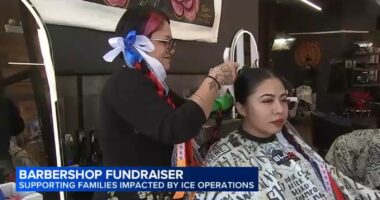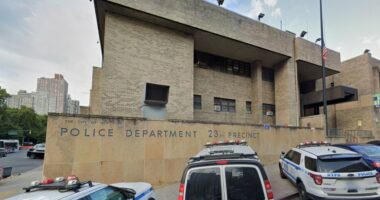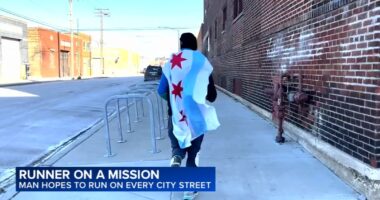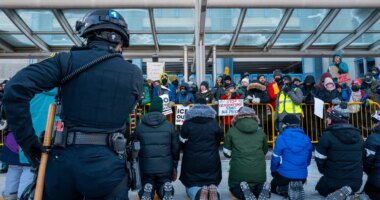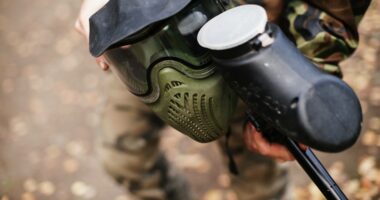Share this @internewscast.com

WASHINGTON (AP) — As House Speaker Mike Johnson convened lawmakers this week to mourn Charlie Kirk, he captured the grief felt by many on Capitol Hill — along with a gripping sense of fear.
“For so many of us, it has felt as if the ground was shaken,” said Johnson, R-La.
The death of Kirk, the well-known conservative activist and founder of Turning Point USA, has shaken lawmakers across the political spectrum, intensifying the ongoing worries about safety amid a charged political atmosphere where threats against opponents and violent rhetoric have become alarmingly prevalent.
In response, Senate Majority Leader John Thune, R-S.D., successfully secured unanimous approval Thursday night for a measure that enables senators to allocate funds intended for their offices and staff towards security measures. House members are also advocating for increased security budgets.
This marks a substantial shift for legislators, who increasingly perceive that participating in public service necessitates security protocols traditionally reserved for the president and Cabinet members.
“Going back several years, there was an understanding of risk. But now it’s changed. Our families are approaching us, asking, ‘What are we going to do?’ Our staff are inquiring, ‘What are we going to do?’” shared Sen. James Lankford, R-Okla.
What security do lawmakers have?
Unlike the president and other key executive officials, most lawmakers do not have security escorts when they leave Capitol Hill, which is protected by the U.S. Capitol Police. Some Congress members opt to pay for private security from personal or campaign resources.
“Members of Congress receive much less security than many of the local officials back at home or judges,” said Rep. Greg Casar, D-Texas. “Oftentimes, we have been the least secure.”
He said that “political violence is meant to silence us. And we can’t be silenced for the sake of democracy. And so, providing some level of safety and security for our members, I think, is key.”
The number of threat assessment cases handled by the Capitol Police has grown steadily over the past four years. The department says it tracked more than 9,000 cases of reported threats in 2024 and is on track to handle roughly 14,000 by the end of this year.
A push to increase security funding
“This is a national security issue. This is a big deal and we’re taking it very seriously,” said Florida Rep. Anna Paulina Luna, who was in a group of GOP lawmakers who met with Johnson multiple times this week to push for more security money in a package to fund the federal government.
Luna said many of the lawmakers have faced security threats — to themselves or their loved ones — that are the subject of law enforcement investigations. Lawmakers say they now routinely face death threats, “ swatting” calls, bomb scares and vandalism at their offices.
“We’ve been needing this,” Luna said. “The fact that it took for this to happen to even address this is crazy to me, but it needs to be dealt with.”
The government funding bill passed by the Republican-controlled House on Friday would add about $88 million in security money for lawmakers and members of the Supreme Court and executive branch.
A temporary program that offers a monthly stipend for House members doubled its funding to $10,000 per member from $5,000. The House Administration Committee launched the program in July after the assassination of Minnesota state Rep. Melissa Hortman and her husband.
Through the program, House lawmakers are also allowed to spend up to $20,000 on in-home security equipment.
The cash infusion does not affect the president, who is protected by a separate budget for the Secret Service, or the Capitol Police, which guards the Capitol complex — the Capitol, Supreme Court, the Library of Congress and scores of offices staffed by government and political officials.
“Federal judges have marshals. Obviously, the executive has federal law enforcement. Members of Congress are unprotected,” said Rep. Maxwell Frost, D-Fla. “We’re in a heightened time of political violence,” Frost said, adding that he thought it was “ridiculous” that lawmakers had to use their personal or campaign funds to protect themselves.
Rep. Tim Burchett, R-Tenn., criticized the GOP leaders for not providing more security money. He questioned whether they appreciate the situation facing elected officials today.
“I just think it’s tough for leadership to understand they’re in their little protective bubble with security details and (Chevrolet) Suburbans. They don’t have to stand in line, they’re not in crowds, and then we’re out basically on our own with our families, and that’s a very scary proposition right now,” Burchett said.
Rep. Derrick Van Orden, R-Wis., said the FBI was investigating multiple death threats against his family and he argued that such cases should be prosecuted as terrorism. “We have security, but we need enhanced security,” he said.
Utah Rep. Blake Moore, vice chair of the House Republican Conference, cited “large bicameral, bipartisan agreement that there needs to be more done.” He added: “It’s just finding that sweet spot to be fiscally responsible, but also make sure that we’re in a good spot.”
Working with local law enforcement
Moore noted that local law enforcement had been especially responsive in stepping up to protect lawmakers in their districts and he commended that support.
Lawmakers said they often coordinate with law enforcement agencies in their districts so that there are officers at local events, but as they travel between their home districts and Washington, they often feel vulnerable.
Rep. Debbie Wasserman Schultz, D-Fla., is calling for a “comprehensive” security plan for all House members, including security personnel who would travel with the lawmakers.
She said that in the past she had hesitated to increase security because it puts a barrier between her and constituents. But the recent high-profile killings of political figures, as well as the shooting of her friend, then-Rep. Gabby Giffords, D-Ariz., in 2011, has convinced her that the protection is necessary.
“It’s really to me become a necessity to protect our constituents, to protect us, to protect our staff, our family members,” Wasserman Schultz said. “The risk is too great.”
___
This story has been corrected to reflect that Rep. Van Orden’s first name is Derrick, not Derek.


